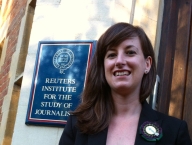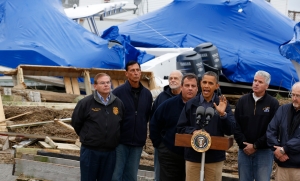 Despite high temperatures, droughts and record wildfires, the 2012 presidential campaign in the US will go down in history as the first, since 1988, that saw no mention of climate change in any of the presidential and vice presidential debates.
Despite high temperatures, droughts and record wildfires, the 2012 presidential campaign in the US will go down in history as the first, since 1988, that saw no mention of climate change in any of the presidential and vice presidential debates.
However, with millions of Americans still suffering the effects of superstorm Sandy, President Obama broke the climate silence in his victory speech claiming that ‘we want to pass on a country that isn’t threatened by the destructive power of a warming planet’. The following week he made same references in his first White House press conference, raising expectations among campaigners and the clean energy industry. Will the re-elected president be able to move the climate agenda forward in his second term?
Obama will soon have three opportunities to show where he ranks the issue in his new agenda. The Climate Conference this week in Doha (Qatar) will be the first. The position of the American delegation, headed by the state department climate envoy, Todd Stern, will be scrutinised for signs by activists. They expect that the US continues supporting the goal reached last year in Durban, which includes limiting warming to 2C from pre-industrial times.
The next salient point would be persuading Congress to extend the wind-energy Production Tax Credit (PTC) before it expires at the end of the year. Not extending the PTC, which gives 2.2 cents back to wind developers for every kilowatt-hour generated, would kill thousands of jobs according to the industry, and abolish the immense gains made in this field by the US in the past decade.
A third test will be Obama’s decision about a proposed pipeline, Keystone XL, which would transport oil from Western Canada to Texas Gulf Coast refineries. After putting off the issue during his re-election campaign, the president will have to decide whether to block or approve the project in the first half of next year. The broader climate movement thinks that decision is an important opportunity for Obama to show if climate change is really a personal priority.

U.S. President Barack Obama (3rd R) speaks in a neighborhood after he tours damage done by Hurricane Sandy in Brigantine, New Jersey, October 31, 2012. New Jersey Governor Chris Christie stands behind Obama. Putting aside partisan differences, Obama and Christie toured storm-stricken parts of New Jersey together on Wednesday, taking in scenes of flooded roads and burning homes in the aftermath of superstorm Sandy. REUTERS/Larry Downing
While we wait for those decisions, there is some cause for cautious optimism. First, opinion polls suggest public concern in the US about climate change was rising even before hurricane Sandy. Secondly, the American companies have begun to see business in investing in clean technologies and renewable energy. A recent report by the Climate Group pointed that clean energy could win 3 trillion for the economy in the US. The study was presented last September in the New York Climate Week, where, surprisingly, there were more businessmen than activists, as in most of the last international climate change events I have recently covered.
Because of Republican dominance in Congress, it would be difficult to see the Senate passing comprehensive climate change legislation. Still, Obama can work on policies that may help cut greenhouse gases 17 percent by 2020, and push ahead with EPA (Environmental Protection Agency) regulations on emissions from other sectors of the economy, beyond coal power plants introduced so far.
Hurricane Sandy has provided Obama with the best starting point for national conversation about climate risks, and building a bipartisan consensus for action. There are many American companies willing to make the transition to a clean energy economy, which keeps them competitive globally, and grow jobs. No matter what, climate change is a challenge that nobody who aspires to lead the world can afford stay silent about.
Catalina Arévalo is an environmental journalist and author at Agencia EFE in Spain. She was a Journalist Fellow at the Reuters Institute in 2011-12, where she researched how the coverage of climate change summits has changed.
Her research paper can be downloaded: Climate Change Summits beyond Copenhagen, Who Goes, Who Stays, and How Are They Covered?
